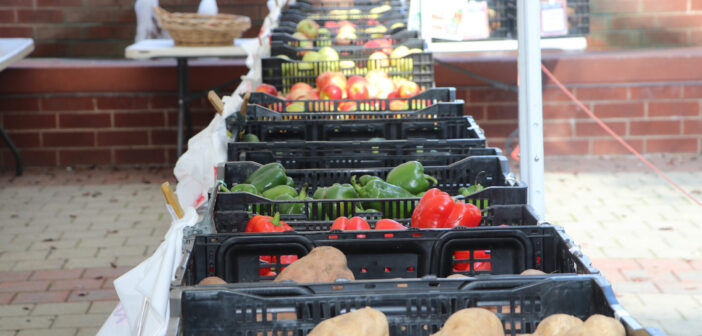With ten years, six focus areas and 113 goals, Lehigh established the Sustainability Strategic Plan 2030 in 2020 as a branch off of three sustainability plans already in place.
As stated on the Office of Sustainability’s webpage, the university’s mission is to “advance solutions that support sustainable change in operations, academics, administration and community.” The plan is a testament to the university’s motto, ‘Homo Minister et Interpres Naturae,’ which translates to ‘Man, the servant and interpreter of nature.”
Within this plan are six focus areas: “climate action, campus operations, educational experience, culture and engagement, health and wellness and focused leadership. Each focus area has specific goals listed on the plan’s outline.
Health and Wellness Goal Four is to “identify select menu items’ carbon and water footprints using a scoring system in Lehigh Dining locations by 2021.”
Deb Martin, manager of the Bethlehem Farmers’ Market, said Health and Wellness Goal One from the plan stands out to her.
The first goal is to “Develop and implement a Sustainable and Healthful Food Policy that sets new standards for measuring the ecological, social and health impacts of on-campus food preparation and consumption by 2021.”
“For the farmer’s market, part of our interest there is in creating a more equitable food distribution system, by bringing whole fresh food into the South Bethlehem area, which is already a food desert,” Martin said. “There are not a lot of full-service supermarkets here, so we are trying to improve food access in South Bethlehem with the new farmers’ market.”
Bringing nutritious and diverse food to the Farmer’s Market is just one way that the university is implementing its plan and aligns with Martin’s goal to improve food quality on campus.
Matt Pulcini, ‘22, said he goes to the Bethlehem Farmers’ Market weekly and credits the farmers’ market with providing him with fresh food.
“I live off-campus, so it is crucial that I am getting food that is both fresh and tasty,” Pulcini said. “Each week when I go to the market, I make sure to go to the same stands for the same produce and food.”
To stay accountable for the work being put into the plan, the Lehigh Lead Department, part of a leadership initiative at Lehigh, will ensure that the plan is progressing. The Office of Sustainability will also provide a strategy to stay on top of the initiative. This goal will be implemented through 2030.
Caroline Nagy, ‘22, worked with the Office of Sustainability in 2020 and 2021. She said the office’s priorities were always the planet, the university and its students. She said she loved that every project she worked on was dedicated to giving back.
Nagy said one of the program initiatives she worked on is called the Swap Shop, a second-hand program where students can donate clothes for other students to claim for free. Nagy said the Swap Shop has been a great success, and items are usually claimed within seconds of posting them on Instagram.
“The Office of Sustainability does a really great job with student engagement,” Nagy said. “It felt super rewarding working with a team that’s doing so much great work within the Lehigh community and within the broader higher education sustainability community as well.”
The Office of Sustainability did not respond to The Brown and White for comment.






Comment policy
Comments posted to The Brown and White website are reviewed by a moderator before being approved. Incendiary speech or harassing language, including comments targeted at individuals, may be deemed unacceptable and not published. Spam and other soliciting will also be declined.
The Brown and White also reserves the right to not publish entirely anonymous comments.